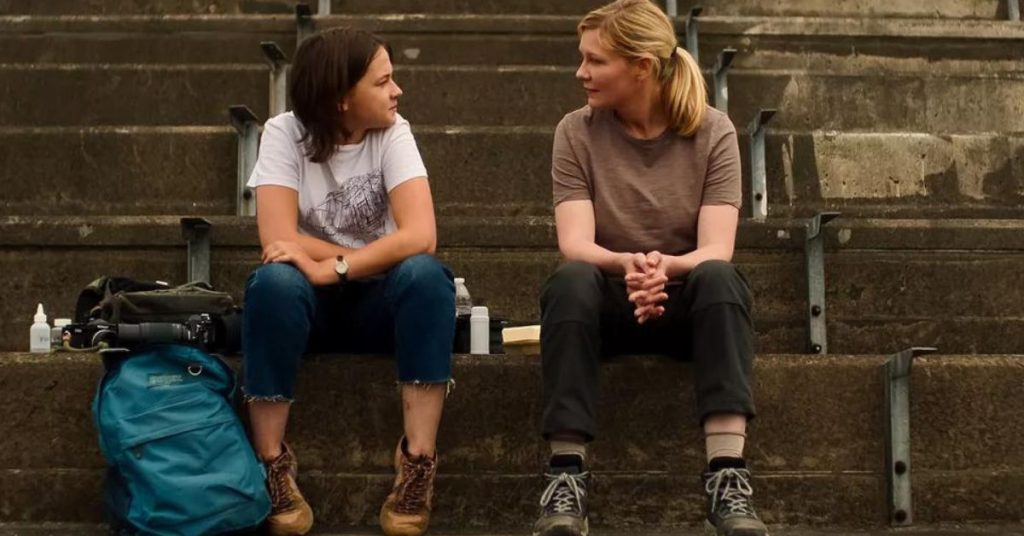By: Russ Matthews
Alex Garland (Ex Machina, Annihilation) may not be a name that’s familiar to many.
Yet, in his film making career, he has managed to write and direct some of the most creative works in cinemas. His vision of a dystopian future combines brilliance with an unnerving component that has garnered characters and stories that continue to capture the imagination. His latest project taps into the potential division within the United States, leading to a civil war between the states and the federal government.
Garland embeds the audience into the centre of the action as it unfolds with a team of journalists trying to get the story affecting the country out to the world. Photojournalist Lee Smith (Kirsten Dunst) leads a small team that foresees the downfall of the current administration and strives to get to Washington, DC, before the Western forces. Yet, the journey is marked by precarious situations in every community as anarchy and confusion have taken over the country since law enforcement has been disbanded.
Their press credentials allow the team to move through each community and even provide them access to local battle scenes that occur along the way. As Lee tries to protect and mentor the aspiring photographer, Jessie (Cailee Spaeny), her Reuter’s partner, Joel (Wagner Moura), attempts to navigate the backroads of America to get them to the nation’s capital before it falls.
From the opening scene, Garland’s story announces the cautionary messaging of how close the United States is to destroying itself from within its own borders. Yet, the masterful manner that this film maker has gone with this storyline is how he manages to do this without taking clear sides on the topics affecting the country. He doesn’t pit race, social class or political affiliations against one another. Instead, the writer/director shows how horrifically this war would impact everyone, even those who choose to ignore what is happening in their neighbourhood.
As a neutral observer, he gives the viewer a perspective of judging each community and situation without making commentary that would steer the interpretation of each scenario as it unfolds. As these journalists travel between communities, military actions and personal challenges, the audience gets a front-row seat to the horrors of war that should lead to reconciliation within this mighty nation.

Americans will feel mixed emotions as the movie rolls forward, which will cause tensions between patriotism, justice and what it is to be an American. What is most unnerving is the plausibility of all of this unfolding and how unnerving this possible reality impacts the emotional state of a nation. Kirsten Dunst, Wagner Moura, Stephen McKinley and Cailee Spaeny make a perfect social experiment that represents the majority of the population and how each sees the downfall of America in a different way. Outside of some unlikely scenarios and equipment usage, there is little to discredit Alex Garland’s film. Every scene has a purpose; each character serves their role convincingly, and the story allows the audience to determine what they must do with what unfolds before them. Civil War proves to be a warning for countries and people that should lead to conversations of unification, forgiveness, identity, and reconciliation.
Reel Dialogue: Where do we find our identity?
One of the most profound moments in the film developed into one of the most ghastly as the journalists were asked, ‘What kind of American are you?’ This is a question that strikes right at the heart of personal identity. The answer to ‘Who are you?’ has plagued philosophers, theologians and university professors for centuries. The world of Civil War continues the discussion on identity by evaluating what it takes to determine who you are in this world.
Remember that this is a work of fiction. Still, these questions should force every one to determine who they are and what defines their existence. Fiction or not, it does not minimise the fact that people continue to question what it means to be a person. What might surprise many people is that there is one reference that can answer this question, the Bible.
It states that regardless of where we were born, where we live and what political affiliation we may identify with, we are made in the image of God, which means that God has a particular position for us in this world. An answer that merely begins to provide the direction to this existential query. So, why not dig in more? Interestingly, this study of humanity could bring one closer to knowing God and more about who you are.
So God created man in his own image, in the image of God he created him; male and female he created them. – Genesis 1:27
Article supplied with thanks to City Bible Forum.
All images: Movie stills
About the author: Russ Matthews is a film critic at City Bible Forum and Reel Dialogue. He has a passion for film and sparking spiritual conversations.
